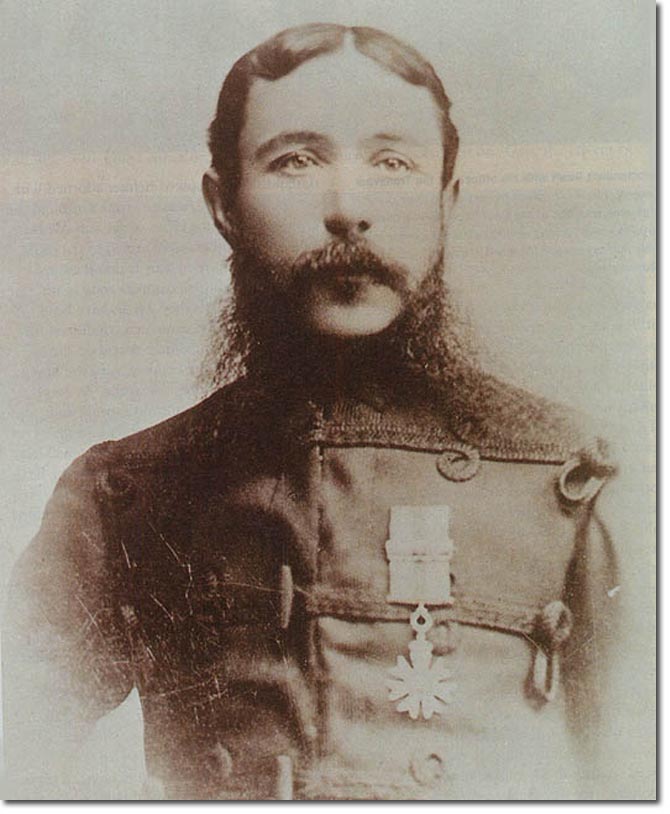|
|


|
|
Pieter Raaff was an Afrikaner who served the British as the commander of the Transvaal Rangers. He was born in the Orange Free State in 1849, at which time it was called Transorangia. In 1865, when he was only 16 he fought in the Boer dispute with Basutoland and took part in the storming of Thabo Bosigo's mountain stronghold. He was badly wounded in the battle. He later married Catherine who was described as a noted beauty and a magnificent horsewoman. They had five children. In 1878 he was with the Lydenberg Rifles, in Colonel Hugh Rowlands' column which set out to attack the stronghold of Chief Sekhukhune of the Pedi tribe. The expedition failed but Rowlands was called on to command no.5 Column in the 1879 invasion of Zululand and Pieter Raaff asked if he could raise a cavalry unit to join the column.
Raaff's Transvaal Rangers were at first ordered to Derby close to the northern border of Natal, but when Rowlands' column was broken up the mounted troops were attached to Evelyn Wood's no.4 Column. The ill-conceived attack on Hlobane mountain cost many lives, especially those of the irregular cavalry under Redvers Buller's command. The Transvaal Rangers were in the group that came in from the east and scaled the heights in pouring rain. The attack looked, initially, like a success but a Zulu impi of 23,000 approached and the retreat of Buller's men began. It turned into a disastrous rout down Devil's Pass and only the actions of a few brave men prevented a total massacre. Buller singled out Pieter Raaff to praise him for his distinguished conduct. The battle that followed, at Kambula was a victory for Wood's troops and Raaff again was responsible both for giving early warning of the approach of the impi, and for leading a sortie against the right horn of the Zulu formation. He was involved in the battle of Ulundi but it was the end of the war and the irregular units were disbanded. The Transvaal Rangers went home and Raaff was awarded the Order of St Michael and St George, which he proudly wears in the photo. After the war Raaff was employed by the British as a political officer and found himself caught in the middle of a growing confrontation between the Boers and his employers. He warned the British about a Boer attempt to rescue one of their number who was being held for trial in Middelburg. When the First Boer War started, Raaff was in a dangerous situation but continued to act as a go-between for negotiations at Potchefstroom. This was a fortified town with British troops which eventually came under attack from 4,000 Boers. They forced the surrender of Raaff and other officials and they were jailed for treason. He was tried and sentenced to death. Two other Afrikaners who worked for Raaff were also tried, and executed, but Raaff was given a reprieve by Paul Kruger. The siege of Potchefstroom went on and Raaff remained in jail until the armistice was declared. Although peace came to the Transvaal, Raaff was regarded as a collaborator so he and his family moved back to the Orange Free State where he started a butchery business. He then became a gold prospector in the Transvaal for a few years, until Rhodes and Jameson began their incursion into what became Rhodesia. Raaff migrated north to settle there and achieved prominence as the Resident Magistrate of the Fort Tuli District in Mashonaland. When the Matabele War began Raaff re-raised the Transvaal Rangers and led one of the columns which set out to capture King Lobengula. This was the war in which Major Allan Wilson's Shangani patrol made a famous last stand, on 4th Dec 1893, against 3,000 Matabele warriors. The rest of the field force was in a desperate situation and the commander, Major Forbes, was held responsible for Wilson's death. The second in command was Pieter Raaff and it was up to him to take charge and extricate the army from destruction. They had to leave their fortified camp without alerting the Matabele so Raaff ordered that dummies be constructed, dressed in uniform, and dummy guns placed on the ramparts, to fool the tribesmen into thinking they were still there. This gave them time to get away, but it was a fighting retreat. They reached the relief force, led by Cecil Rhodes, and Raaff was treated as a hero. This was the crowning moment of his military career but soon afterwards, in 1894, he died. The cause of his death is a bit of a mystery, but was thought to be a bowel inflammation. His wife survived him by many years, dying at the age of 93 in the 1950s. |
Zulu War | Zulu War Significant Individuals
Armed Forces | Art and Culture | Articles | Biographies | Colonies | Discussion | Glossary | Home | Library | Links | Map Room | Sources and Media | Science and Technology | Search | Student Zone | Timelines | TV & Film | Wargames
